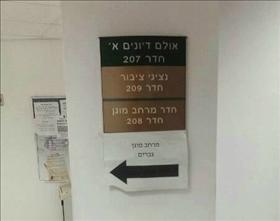A dangerous trend
Hiddush expresses fury over gender-segregated shelters at rabbinical court
Gender segregation in the bomb shelter of an Ashdod Rabbinical Court building is a potentially fatal reminder of the need to criminalize the exclusion of women in the public sector.
21/07/2014 00:41
Tags: gender segregation · rabbinical courts · Ashdod

''Men Only'' sign in the Ashdod Rabbinical Court's bomb shelter Picture: MK Stav Shaffir
Hiddush- Freedom of Religion in Israel strongly denounced the gender segregation that was implemented in the building of a rabbinical court in Ashdod.
Rabbi Uri Regev, President of Hiddush, saw this potentially deadly incident directly linked to the growing trend of gender discrimination in Israeli ultra-Orthodox communities. “This case proves how important it is to advance legislation under which discrimination against women in the public sphere will be a criminal offense,” he responded.
Rabbi Regev notes that this coercive gender segregation in a public institution demonstrates “how distant the Haredi fanaticism has grown from Judaism, in which the sanctity of life trumps all, and certainly [comes] above the obsession with modesty.”
“This case proves how important it is to advance legislation under which discrimination against women in the public sphere will be a criminal offense,”
The signs were found in the rabbinical court building during Operation Protective Edge, in which the port city of Ashdod came under incessant rocket attacks from the Gaza Strip. The need for quick and easy access to bomb shelters have become a necessary element for residents in Ashdod.
Due to the Chief Rabbinate's Orthodox monopoly over personal status in Israel (including marriage and divorce), all Israeli Jews who seek to marry must do so through the rabbinical courts.
“The signs in the rabbinical court [shelters] are further proof that the rabbinical courts are a discriminatory and hostile place for women, and how crucial it is to create an alternative, [namely] civil marriage and divorce. In that way, the majority of the public, which loathes the rabbinical courts’ treatment of women, could avoid any contact with this dark institution.”